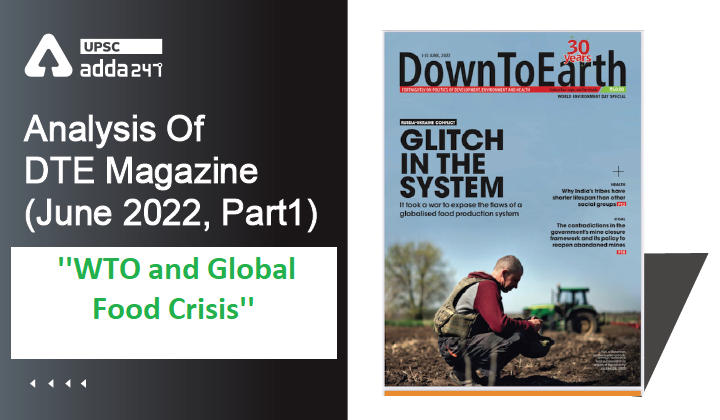Table of Contents
WTO and Global Food Crisis
Introduction
- Due to the Russian invasion of Ukraine, the world hurtles toward another food crisis and the spotlight has again shifted to the World Trade Organization (WTO) and its role in impeding the food security concerns of a host of developing countries.
- In this crisis situation, a central question that has divided economists, policymakers and humanitarian organisations is whether WTO has been the chief villain of the food crises in the new century.
- Has its complex and asymmetrical rules on subsidies embedded in its 1995 Agreement on Agriculture (AoA) exacerbated the vulnerabilities of poor developing countries while allowing the developed countries to continue with their lavish grants to farmers and exporters, and perpetuate the distortions it was pledged to reform?
Importance of unrestricted imports
- Between 2016 and 2018 about 85 per cent of Africa’s food was imported and that net food imports are expected to triple by 2025 even as undernourishment grows by one-third.
- Similar is the story in the Caribbean, where food imports as a proportion of merchandise exports skyrocketed from 5 per cent in 1995 to 32 per cent in 2019.
The not so good history of WTO
- The history of WTO’s functioning over the past 27 years clearly gives a clear picture of how WTO’s policies help developed nations ignoring the food security claims of the developing countries.
- For close to three decades one has witnessed an asymmetrical battle at the apex trade body where developing countries have had to fight tooth and nail to secure the policy space for their food security programmes.
- 2008 flags the year in which substantial reforms of AoA were defeated at the last moment by rich nations.
- In 2011, when food prices once again spiked to alarming levels, WTO had failed to adapt and had tied the hands of developing countries with its trade rules.
India’s Struggle on the issue of public stockholding of food grains
- India has been in the line of fire for its policy of procuring foodgrains at an administered price instead of the market rate and exceeding the de minimus level permitted by WTO.
- This rule sets subsidy at 10 per cent of the total value of production which means India is regularly breaching its limits.
- However, a peace clause agreed upon at the 9th Ministerial Conference in Bali in 2013 means it cannot be legally challenged at WTO.
Efforts by India led G33 Countries
- Led by India, members of the G33 developing countries have been pressing for a permanent solution on the issue of procuring foodgrains, which was to have been formulated by 2017.
- As a result India’s volume of purchases and release of stocks, including the determination of the release price and targeting are under constant scrutiny not just from developed countries such as the United States, United Kingdom and Japan but also from fellow member of G33.
Free trade doesn’t take care of crisis situations
- When we talk of globalisation, we say free trade will take care of any crisis situation. But it has not been the case so far.
- In a crisis, governments want to take care of their own. Normally, exporters wish to export more, while net importing countries tend to impose tariffs to protect their producers.
- They try to balance the object of providing affordable food to consumers and protecting their producers.
- The exporting countries look to impose export bans (like Indonesia banned edible oil export), while the net food importing countries reduce their tariffs to obtain affordable food items.
Conclusion
Big economies continue to use subsidies and most of the recorded subsidy programmes are in the largest trading economies of the US, EU and China. This systemic issue has to be addressed urgently because it undermines long-term food security.



 TSPSC Group 1 Question Paper 2024, Downl...
TSPSC Group 1 Question Paper 2024, Downl...
 TSPSC Group 1 Answer key 2024 Out, Downl...
TSPSC Group 1 Answer key 2024 Out, Downl...
 UPSC Prelims 2024 Question Paper, Downlo...
UPSC Prelims 2024 Question Paper, Downlo...
